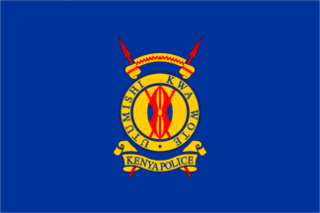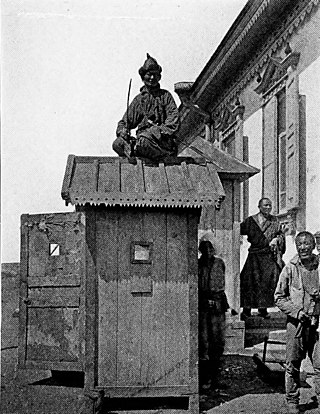
Eswatini, officially the Kingdom of Eswatini and also known by its former official name Swaziland and formerly the Kingdom of Swaziland, is a landlocked country in Southern Africa. It is bordered by Mozambique to its northeast and South Africa to its north, west, south, and southeast. At no more than 200 km (120 mi) north to south and 130 km (81 mi) east to west, Eswatini is one of the smallest countries in Africa; despite this, its climate and topography are diverse, ranging from a cool and mountainous highveld to a hot and dry lowveld.
The Umbutfo Eswatini Defence Force (UEDF) is the military of the Southern African Kingdom of Eswatini (Swaziland). It is used primarily during domestic protests, with some border and customs duties; the force has never been involved in a foreign conflict. The army has struggled with high rates of HIV infection. Since measures were put in place the rate is dropping.

Hhohho is a region of Eswatini, located in the north western part of the country. Hhohho was named after the capital of King Mswati II, who expanded the Swazi territory to the north and west, taking in the districts of Barberton, Nelspruit, Carolina and Piet Retief. These areas were later acquired by what was the Province of Transvaal and today they form part of the Mpumalanga Province of South Africa. It has an area of 3,625.17 km², a population of 320,651 (2017), and is divided into 14 tinkhundla. The administrative center is the national capital of Mbabane. It borders Lubombo Region on the southeast and Manzini Region in the southwest.

The Kosovo Police is the national policing law enforcement agency of Kosovo. It was established in 1999 and took its current form with the 2008 police law. It consists of five departments and eight regional directorates and is represented at the political level by the Ministry of Internal Affairs and Public Administration of the Republic of Kosovo.

Lobamba is a city in Eswatini, and is one of the two capitals, serving as the legislative, traditional, spiritual, seat of government of the Parliament of Eswatini, and Ludzidzini Royal Village, the residence of Queen Ntfombi, the Queen Mother.

Manzini is a large city in Eswatini (Swaziland), which is also the city of Eswatini's Manzini Region. The city is the country's second largest urban center behind the capital Mbabane, with a population of 110,000 (2008). It is known as "The Hub" of Eswatini and lies on the MR3 road. Eswatini's primary industrial site at Matsapha lies near the town's western border.

In Brazil, the Federal Constitution establishes eight law enforcement institutions - seven titulars and one auxiliar. The titular institutions are: the Federal Police, the Federal Highway Police, the Federal Railroad Police, the Federal Penal Police, the State Military Police and Fire Brigade, the State Civil Police and the State Penal Police. Of these, the first four are affiliated to federal authorities and the latter three are subordinated to state governments. These public safety institutions are part of the Executive branch of either federal or state government. Apart from these eight institutions, there are others which affiliate to municipal authorities: the Municipal Guards. According to Minister Alexandre de Moraes of the Supreme Federal Court, "...the Municipal Guards are inserted in public safety as the auxiliary and related body of public security force..." Federal law 13,022 gave them de facto and de jure police attributions.

The Kenya Police Service is a national body in charge of law enforcement in Kenya. It is subordinate to National Police Service which is headed by Inspector General of Police who exercises independent command over the Service. Kenya Police is headed by Deputy Inspector General. Kenya Police is divided into Service Headquarters in Nairobi, Formations, General Duty Commands and Training Institutions.
Law enforcement in Azerbaijan comes under the control of the Ministry of Internal Affairs of Azerbaijan, which administers the National Police of the Republic of Azerbaijan. Admitted to the Organization for Security and Co-operation in Europe (OSCE) on 30 January 1992, with an OSCE office opening in Baku on 16 November 1999. It is a member of INTERPOL.
Law enforcement in Mali is the responsibility of the National Police Force, which is subordinate to the Ministry of Internal Security and Civil Protection. The National Police Force shares responsibility for internal security with the Gendarmerie, a paramilitary organization; the police are responsible exclusively for urban areas, while the Gendarmerie's primary responsibility is for rural areas, though it may also reinforce the police when needed. According to The Wall Street Journal, each organization has approximately 5,000 personnel, while Interpol gives a figure of over 7,000 for the police.

Law enforcement in Ethiopia is dealt with by the Ethiopian Federal Police at federal level and by regional police commissions in the Regions of Ethiopia. The Ethiopian Federal Police (EFP) was established in 1995 to serve the public, to ensure the observation of human and democratic rights and to maintain the safety and welfare of the public. Its stated duties are the enforcement of laws and safeguarding constitutional guarantees, the prevention, detection and investigation of crime, the coordination of national state police commissions and development of national policing standards. The EFP also has to provide operational support to regional police commissions.
However, local militias also provide local security largely independent of the police and the Ethiopian military. Corruption is a perennial problem, particularly among traffic police who solicited bribes.
The U.S. Department of State states that its contacts within the Ethiopian government report that the findings of investigations into abuses by local security forces, such as arbitrary detentions and beatings of civilians, are rarely made public. However, the Ethiopian government continued its efforts to train police and army recruits in human rights. During 2008 the government was seeking assistance from the International Committee of the Red Cross, the local non-governmental organization Prison Fellowship Ethiopia (JFA-PFE), and the Ethiopian Human Rights Commission to improve and professionalize its human rights training and curriculum. The JFA-PFE provided human rights training for police commissioners and members of the militia in 2008.

The International Criminal Police Organization – INTERPOL, commonly known as Interpol, is an international organization that facilitates worldwide police cooperation and crime control. It is the world's largest international police organization. It is headquartered in Lyon, France, with seven regional bureaus worldwide, and a National Central Bureau in all 196 member states.
Education in Eswatini includes pre-school, primary, secondary and high schools, for general education and training (GET), and universities and colleges at tertiary level.
Ahmadu Giade, a retired deputy commissioner of police, was appointed chairman of the Nigerian National Drug Law Enforcement Agency (NDLEA) in November 2005. He replaced Bello Lafiaji, who was dismissed by President Obasanjo due to allegations of corruption. Giade has also served as Special Assistant on Narcotic Drugs and Psychotropic Substances to the president of Nigeria, Muhammadu Buhari.
Prostitution in Eswatini is illegal, the anti-prostitution laws dating back to 1889, when the country Eswatini was a protectorate of South Africa. Law enforcement is inconsistent, particularly near industrial sites and military bases. Police tend to turn a blind eye to prostitution in clubs. There are periodic clamp-downs by the police.

Eswatini, Africa's last remaining absolute monarchy, was rated by Freedom House from 1972 to 1992 as "Partly Free"; since 1993, it has been considered "Not Free". During these years the country's Freedom House rating for "Political Rights" has slipped from 4 to 7, and "Civil Liberties" from 2 to 5. Political parties have been banned in Eswatini since 1973. A 2011 Human Rights Watch report described the country as being "in the midst of a serious crisis of governance", noting that "[y]ears of extravagant expenditure by the royal family, fiscal indiscipline, and government corruption have left the country on the brink of economic disaster". In 2012, the African Commission on Human and Peoples' Rights (ACHPR) issued a sharp criticism of Eswatini's human-rights record, calling on the Swazi government to honor its commitments under international law in regards to freedom of expression, association, and assembly. HRW notes that owing to a 40% unemployment rate and low wages that oblige 80% of Swazis to live on less than US$2 a day, the government has been under "increasing pressure from civil society activists and trade unionists to implement economic reforms and open up the space for civil and political activism" and that dozens of arrests have taken place "during protests against the government's poor governance and human rights record".
Eswatini formerly known as Swaziland, a country located in Southern Africa is a source, destination, and transit country for women and children subjected to trafficking in persons, specifically commercial sexual exploitation, involuntary domestic servitude, and forced labor in agriculture. Swazi girls, particularly orphans, are subjected to commercial sexual exploitation and involuntary domestic servitude in the cities of Mbabane and Manzini, as well as in South Africa and Mozambique.

The Ministry of Justice and Home Affairs is the sole organ of national security in Mongolia. The primary force is responsible for maintaining law and order and preventing crime throughout the country is the National Police Agency, created in 1965 and headquartered in the capital Ulaanbaatar. Interpol has an office within the Mongolian Police.
A series of protests in Eswatini against the absolute monarchy and for democratisation began in late June 2021. Starting as a peaceful protest on 20 June, they escalated after 25 June into violence and looting over the weekend when the government took a hardline stance against the demonstrations and prohibited the delivery of petitions. Lower-level unrest and protests continued until summer 2023.












